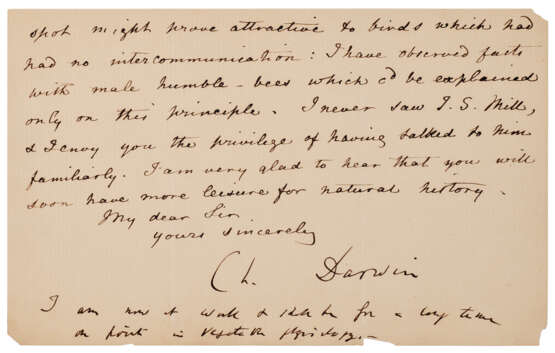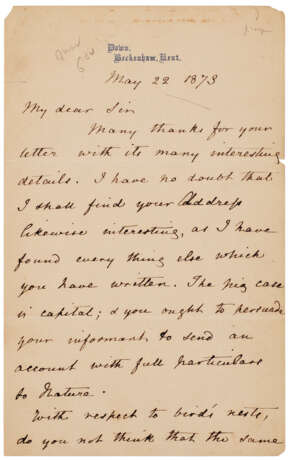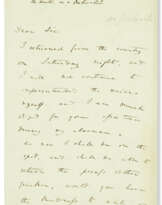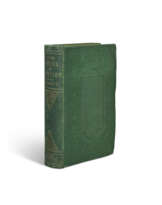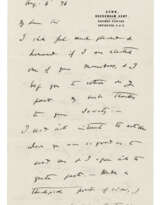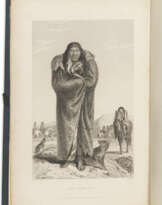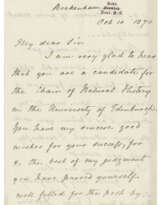ID 1032687
Lot 35 | On the nesting habits of birds
Estimate value
$ 7 000 – 10 000
Two pages, 200 x 125mm on his personal stationery with autograph postcript; the body of the text in the hand of Emma DARWIN (1808-1896). (Minor chips at corners and right margin, mild creases).
An unpublished letter concering bird nesting habits and expressing his envy for Weir's association with John Stuart Mill— whom Darwin had never met. Darwin thanks Weir for his letter "with its many interesting details. I have no doubt that I shall find your address likewise interesting, as I have found everything else which you have written," and comments that "The pig case is capital; & you ought to persuade your informant to send an account with full particulars to Nature." He then wonders whether birds without intercommunication would nest on the same spot, noting that "I have often observed facts with male bumble bees which c[oul]d only be explained on this principle." Replying that he never met John Stuart Mill, and envying Weir a conversation with him, Darwin concludes "I am very glad to hear that you will soon have more leisure for natural history," adding in an autograph postscript that he is at work on questions of vegetable physiology (possibly referring to Insectivorous Plants, published in 1875). John Jenner Weir (1822-1894) was part of Darwin’s far-flung network of non-professional natural history correspondents. Weir is cited 45 times in the first edition of The Descent of Man (1871), and exchanged over 85 letters with Darwin. Darwin himself refers to Weir’s observations in letters to Wallace, Bates, and Hooker. Such communications and support were immensely valued by Darwin and were of crucial importance to the steady accumulation of factual detail that was central to his scientific method and research. "If there was any single factor that characterised the heart of Darwin’s scientific undertaking it was [his] systematic use of correspondence. Darwin made the most of his position as a gentleman and scientific author to obtain what he needed. He was a skilful strategist. The flow of information that he initiated was almost always one-way. Like countless other well-established figures of the period, Darwin regarded his correspondence primarily as a supply system, designed to answer his own wants . . . . 'If any man wants to gain a good opinion of his fellow men, he ought to do what I am doing, pester them with letters;' he once said to John Jenner Weir" (Browne, vol. 2, p. 12). The Calendar of the Correspondence of Charles Darwin, 8919, records this letter (and identifies the recipient) on the basis of Darwin’s copy in the Darwin Papers at Cambridge University Library, but did not know the whereabouts of the original, offered here, which is addressed "My dear Sir," not to Weir by name; Darwin Correspondence Project 8919 (summary only).
| Artist: | Charles Robert Darwin (1809 - 1882) |
|---|---|
| Place of origin: | England |
| Auction house category: | Letters, documents and manuscripts, Medicine & science |
| Artist: | Charles Robert Darwin (1809 - 1882) |
|---|---|
| Place of origin: | England |
| Auction house category: | Letters, documents and manuscripts, Medicine & science |
| Address of auction |
CHRISTIE'S 20 Rockefeller Plaza 10020 New York USA | ||||||||||||||
|---|---|---|---|---|---|---|---|---|---|---|---|---|---|---|---|
| Preview |
| ||||||||||||||
| Phone | +1 212 636 2000 | ||||||||||||||
| Fax | +1 212 636 4930 | ||||||||||||||
| Conditions of purchase | Conditions of purchase | ||||||||||||||
| Shipping |
Postal service Courier service pickup by yourself | ||||||||||||||
| Payment methods |
Wire Transfer | ||||||||||||||
| Business hours | Business hours
|
